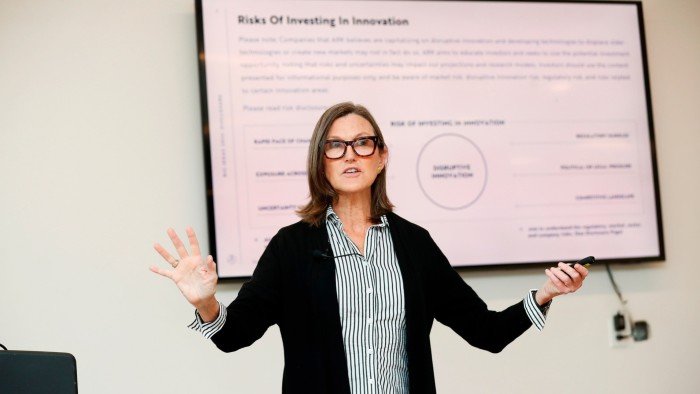Even Cathie Wood thinks the US is entering a recession

Unlock the Editor’s Digest for free
Roula Khalaf, Editor of the FT, selects her favourite stories in this weekly newsletter.
There has been a lot of tariff-related research and commentary hitting Alphaville’s inbox over the weekend. It can broadly be sorted into the good, the bad, the ugly, and the ARK Invest.
The email from the investment group’s head Cathie Wood starts out in classic everything-is-amazing-ignore-the-dumpster-fire ARK style:
While many observers fear that the Trump tariff policy is a recipe for economic and geopolitical disaster, we believe that what looked at first glance like the largest and most regressive tax increase in US history could turn out to be quite the opposite.
No notes. Almost as good as when Wood bragged about how ARK had incinerated so much money that it wouldn’t have to pay capital gains tax “for years”.
Wood then pivots to Elon Musk boosterism, and blaming Peter Navarro for what even she calls a “chaotic situation based on incomprehensible ‘reciprocity’ calculations”:
Now that President Trump has asked Treasury Secretary Bessent to take the lead from Peter Navarro and Howard Lutnick in negotiating with our allies, what once seemed like a chaotic situation based on incomprehensible “reciprocity” calculations could have been a setup — premeditated or otherwise — for serious negotiations that will lead to lower tariffs and non-tariff barriers, neither of which would have been possible without the shock therapy that President Trump administered. Still influential in the Trump Administration, Elon Musk has been a strong advocate for this solution to the tariff and non-tariff trade barriers that have evolved over the last 50 years.
More great stuff. Let’s ignore that Donald Trump’s pretty much only constant political lodestar has been an aversion to free trade and a love for tariffs. This was actually all a brilliant Art of the Deal ploy to ensure more international trade and lower tariffs.
Wood says her “working assumption” has been that President Trump wants a booming economy and stock market by the second half of 2025, ahead of the 2026 midterm elections. Well, sure, what president wouldn’t want that?
But she admits that the first half may be a bit tough:
Even before the tariff controversy, we had been expecting strong growth to begin sometime in the second half, because we do believe that the last leg of a three-year rolling recession will result in negative Gross Domestic Product (GDP) growth for the first and second quarters. During the past three years, as one cohort of the economy after another capitulated to the interest rate shock that started in 2022, high-end consumers and the government propped GDP up. Now, both are giving way, with the government entering its first recession in 30 years. As a result, the Administration and the Federal Reserve will have more degrees of freedom to stimulate than most investors have been expecting. Now that much of the economy has seized up in response to the fear of tariffs, the drop in activity is likely to be more severe than otherwise would have been the case, a clarion call for tax cuts, deregulation, and lower interest rates.
Look, there is actually an argument to be made that the extraordinary budget deficit that the US has been running has indeed flattered the American economy in recent years.
But blaming a recession on government spending cuts when Doge is mostly FAFOing on the edges and the deficit is actually at a record high is extremely desperate (yes the deficit was down 31 per cent in March, but that is mostly to do with the timing of benefit payments and tax receipts. About $83bn of benefit payments for March were actually paid in February because the month started with a weekend. Without this shift, the deficit would have increased 11 per cent in March.)
The US economy was actually pottering along quite nicely until recently, expanding at a roughly 2 per cent clip until Trump took over. The Atlanta Fed’s latest (gold-adjusted) nowcasting model now implies that we probably saw a 0.3 per cent contraction in the first quarter, and the second quarter is likely to be a mess:
A reminder that a mere year ago ARK forecast an average annual growth rate of 7 per cent until 2030 thanks to robotaxis, the blockchain and AI etc.
Further reading:
— Which funds have incinerated the most value over the past decade? (FTAV)
Source link



